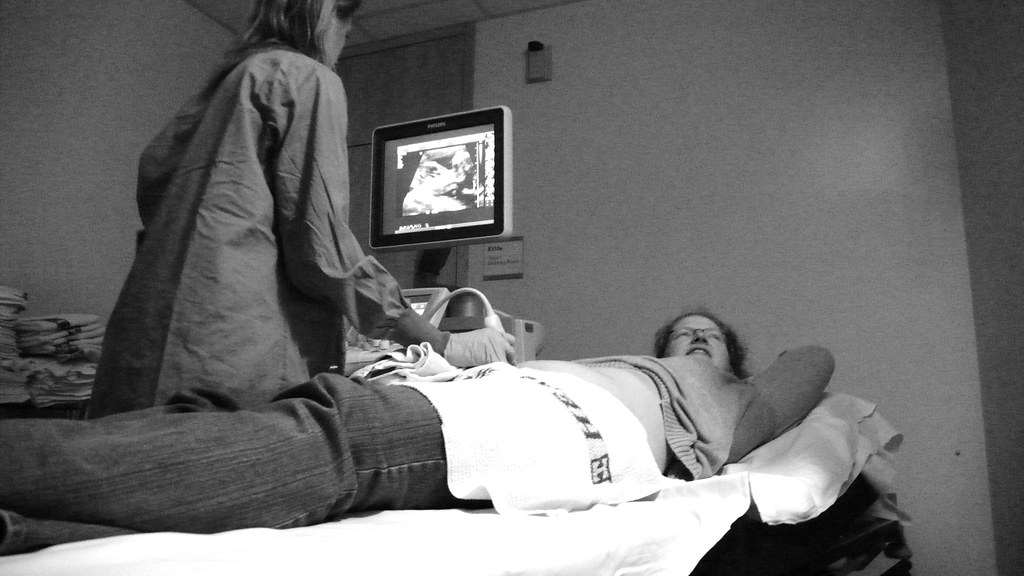
A Religious Right to Disregard Mandatory Ultrasounds
Caroline Mala Corbin
B. K. Dewey / Creative Commons CC BY-NC 2.0
One of the most striking trends in religion clause jurisprudence is the expansion of protection for religious exercise. This includes expanded protection under the federal Religious Freedom Restoration Act (RFRA) and its state counterparts. Often the litigant is a conservative Christian opposed to a progressive development, such as reproductive rights or LGBTQ rights. Given that this trend is here to stay, progressives should avail themselves of this expansive protection when faced with regressive laws.
One major area of expansion has arisen from the low bar the Supreme Court set to establish a “substantial burden” on religious exercise. Lawsuits typically take the form of a religious observer seeking exemption from a law. In the Supreme Court case of Burwell v. Hobby Lobby Stores, Inc., for example, a national arts and crafts chain wanted an exemption from the Obamacare requirement that employers provide their employees with all FDA-approved contraception in their health insurance plans. In Masterpiece Cakeshop, Ltd. v. Colorado Civil Rights Commission, another Supreme Court case, a bakery store sought an exemption from a law banning discrimination on the basis of sexual orientation in public accommodations.
In order to qualify for a religious exemption, the plaintiff must establish that the law substantially burdens their religious practice. Traditionally, a law was understood to impose a substantial burden when it forced someone to violate a central tenet of their faith, such as denying a religious observer the ability to observe their Sabbath or wear religiously mandated apparel.
Hobby Lobby’s interpretation of the Religious Freedom Restoration Act considerably watered down the substantial burden concept and thereby expanded the scope of protection afforded to religious observers. In addition to ruling that a for-profit company could experience a substantial religious burden, Hobby Lobby held burdens could be indirect and attenuated yet still be substantial. The company argued that its religion deemed abortion a sin. Its complaint was not that the law compelled it to undergo an abortion or perform an abortion. Rather, the company argued that including certain kinds of contraception it equated with abortifacients in its employees’ health insurance coverage, as required by law, was a substantial burden because it was a sin to facilitate someone else’s abortion. Or more specifically, they believed that the challenged emergency contraception (e.g. Plan B) and IUDs “may operate after the fertilization of an egg” and work as an abortifacient rather than contraception. (In fact, emergency contraception generally prevents ovulation, but the government did not contest the issue.) Urging deference to the religious objector, the Supreme Court agreed that this potential facilitation amounted to a substantial burden on Hobby Lobby Stores, Inc.
For progressives, this future of religious liberty seems pretty dystopian (and it is). But, there may be a silver lining.
Depending on how courts balance the competing interests, the Supreme Court’s expansion of substantial burden can have devastating real-world consequences. Most immediately, women who worked at Hobby Lobby Stores, Inc. lost health insurance coverage for basic and often expensive health care. Also at stake are a panoply of anti-discrimination laws. For example, if providing goods and services to same-sex couples is a substantial religious burden, as many wedding vendors claim, stores may end up with a legal right to discriminate against vulnerable minorities.
For progressives, this future of religious liberty seems pretty dystopian (and it is). But, there may be a silver lining. After all, there are religious people on both ends of the spectrum. It is not only conservative Christians who have strongly held religious beliefs, but also progressive members of many different faith traditions.
Take health care. Although many insist their religion opposes procedures like abortion or gender transition surgeries and requires them to refuse that care, others believe their faith mandates just the opposite: they have affirmative religious obligations vis-à-vis their patients. This includes doctors—and potentially, health clinics—who feel not just an ethical obligation but a religious obligation to provide compassionate, respectful, and comprehensive medical services to those who trust them with their health. One doctor who provides abortion has said, “I think what I’m doing is because of God, not in spite of God.” Others have described their care as a “mitzvah” or a “ministry.” For these doctors and clinics of faith, laws that compel them to provide substandard care can impose a substantial burden on their religious exercise.

Abortion regulations are one category of laws that may force doctors to violate their religious obligations. For example, several states mandate that doctors provide unnecessary ultrasounds before a woman can terminate a pregnancy, even if both the physician and the patient are unwilling. Kentucky also mandates that the doctor describe the fetal image and make any heartbeat audible. Other than medical emergencies, there are no exceptions. A doctor must perform the procedure, which usually includes inserting an ultrasound wand into a woman’s vagina, even if that woman was raped or distraught by news of a fatal fetal anomaly. As one Kentucky doctor has written, the “cruel and offensive” law forces her to “harm and humiliate the patients who entrust me with their welfare.” Another physician at EMW Women’s Surgical Center in Kentucky testified in court that “[d]uring the process … patients are ‘very upset,’ ‘crying,’ and even ‘sobbing.’”
Government-compelled sub-par care, or worse, degradation, should amount to a substantial religious burden for a religiously committed physician or facility. Thus, those whose religions mandate a certain kind of care or that forbid needlessly inflicting harm should be able to seek a religious exemption. If a retail chain can refuse to provide medical care because it may conflict with its religious beliefs, then a physician should be able to refuse to inflict harmful practices that conflict with their religious beliefs.
If a retail chain can refuse to provide medical care because it may conflict with its religious beliefs, then a physician should be able to refuse to inflict harmful practices that conflict with their religious beliefs.
Granted, the existence of a substantial religious burden does not automatically result in an exemption. But it does mean that the law becomes subject to a rigorous scrutiny. Only if the government can establish that its regulation accomplishes a compelling goal, and that no alternative means of accomplishing that goal are available, will the exemption be denied. These abortion regulations would not survive such scrutiny.
What is the goal of forcing women to have ultrasounds? States often argue that it is to safeguard women’s psychological well-being by ensuring they do not make an ill-informed decision they later regret. However, most women seeking abortions in the United States are already mothers and understand well what is at stake. Moreover, studies repeatedly show women who end their pregnancies do not regret their decision. Even assuming some compelling state interest in furnishing women with information about the developmental stage of her unwanted or nonviable fetus, it could be delivered without forcing a probe up her vagina. For example, the government could give her an illustrated pamphlet. Indeed, Kentucky law already mandated extensive informational disclosures about abortion procedures.
How much difference would this exemption make? It may depend on how the courts implement the exemption. There exists the risk that a court might excuse the doctor from the law’s requirements but not the woman, as futile as it may seem given the law allows the woman to avoid the additional information. However, the law appears to be aimed at physician conduct, since it punishes doctors for failing to comply but not women who refuse to look at the ultrasound or listen to their doctor’s description of it. Therefore, an exemption should allow a doctor to skip the extra ultrasound before proceeding with the abortion, granting relief to both doctor and patient.
Constitutional claims based upon the right to abortion do not trigger the same high level of scrutiny as those based upon religious liberty.
There may be additional benefits to doctors bringing religious liberty challenges to abortion regulations. First, religious liberty challenges will shine a strong light on these laws. Constitutional claims based upon the right to abortion do not trigger the same high level of scrutiny as those based upon religious liberty. (Although Whole Woman’s Health v. Hellerstedt raised the level of scrutiny, the current Supreme Court is likely to lower the level again when it decides this term’s June Medical Services LLC v. Russo.) Without a closer look, courts are less likely to expose the feebleness of the state’s interest or tailoring. The more searching inquiry required by a religious liberty claim will reveal the weak or pretextual justifications motivating most abortion regulations.
Second, religious claims brought by those at the other end of the political spectrum may make the Supreme Court think twice about expanding religious exemptions even further. Emboldened social conservatives have been pressing ever more ambitious claims. Indeed, before the Supreme Court this term is an argument not just that there is a religious right to discriminate, but that there is a religious right to discriminate on the taxpayer’s dime. Suits brought by progressive people of faith might remind the Supreme Court that the religious liberty rights they create will not necessarily be confined to the religions and causes they favor.

Caroline Mala Corbin is a Professor of Law and Dean’s Distinguished Scholar at the University of Miami School of Law. Her scholarship focuses on the First Amendment’s speech and religion clauses, particularly their intersection with equality issues. You can follow her on Twitter @CarolineMCorbin.
Recommended Citation
Corbin, Caroline Mala. “A Religious Right to Disregard Mandatory Ultrasounds.” Canopy Forum, April 1, 2020. https://canopyforum.org/2020/04/01/a-religious-right-to-disregard-mandatory-ultrasounds/

